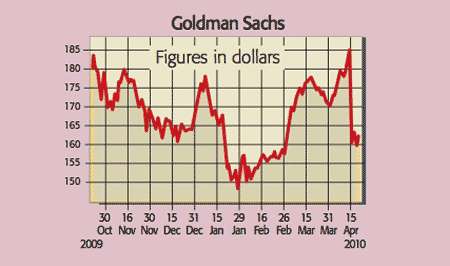
The Securities and Exchange Commission (SEC) has charged Wall Street titan Goldman Sachs with fraud. America’s main markets regulator says that, in 2007, Goldman helped hedge fund manager John Paulson (who is not accused of any wrong-doing) put together a collateralised debt obligation (CDO), a package of subprime mortgage-backed securities, and sold it to investors. But these investors weren’t told that Paulson had hand-picked especially dodgy loans because he wanted to short them. The allegedly duped buyers lost their money and Paulson cashed in.
The furore spread across the Atlantic. Gordon Brown accused the firm of “moral bankruptcy”. German Chancellor Angela Merkel was contemplating “legal steps”, as a German bank was among the investors in the CDO. Britain’s Financial Services Authority (FSA) has launched an official investigation. Goldman’s shares plunged by 14% on the news late last week, and were unmoved by Tuesday’s news of a 94% annual rise in net first-quarter earnings to $3.5bn, on revenues up more than a third to $12bn.
What the commentators said
No wonder, said Jeremy Warner on Telegraph.co.uk. The SEC charges “start the clock on what’s likely to be a veritable deluge of litigation as counterparties try to recover credit-crunch losses”. The broader problem is that “reputation and trust are all” for a bank. A “snowball” of client defection could gravely, possibly even fatally, weaken Goldman.
Goldman’s trademark arrogance won’t help matters, said Simon English in the London Evening Standard. Its response to the SEC was “predictable”, boiling down to: ‘we didn’t do anything wrong, it is not possible that we could ever do anything wrong, and anyone who says otherwise is too thick to understand our brilliance’.
The main headache for now, however, is that the sector’s profitability will be undermined by “an inevitable backlash from legislators who will demand greater control and regulation of what Wall Street does and how it does it”, as Damian Reece pointed out in The Daily Telegraph. The US Congress recently started to hammer out a bill on financial reform and the IMF weighed in too this week.
It essentially said that “financial firms have been undertaxed for too long”, said Nils Pratley in The Guardian. It has therefore recommended that the G20 adopt a “Financial Activities Tax” (FAT), a levy on profits and pay. It also advocates a “financial stability contribution”, a charge on balance sheets that goes towards any future government for support for banks. The IMF’s timing was excellent: its report came the same day Goldman restored its bonus pool to 43% of revenues, up from the 36% it paid in 2009. (See page 8.)